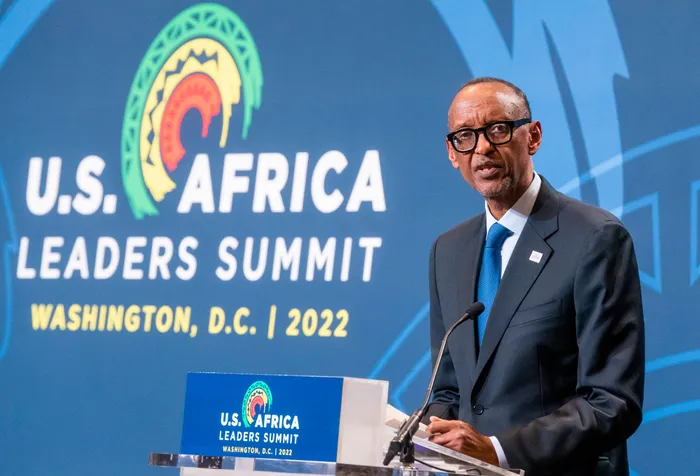Rwanda’s contradictory relationship with Western powers

Picture: Shawn Thew/EPA-EFE – President of Rwanda Paul Kagame delivers remarks at the US Africa Space Forum at the Walter E Washington Convention Centre in Washington, DC, on December 13, 2022. Kagame has on several occasions lambasted the West for interfering in the internal affairs of African countries and looking down on their political systems, says the writer.
By Sizo Nkala
Two recent controversial incidents have put the curious case of Rwanda’s relationship with the West in the spotlight. First was the revelation in March last year in the UK’s Illegal Migration Bill that asylum seekers arriving illegally in the island nation would be sent to Rwanda or another third country considered safe.
A deal was signed between Rwanda and the UK in April last year to facilitate the transfer of immigrants deemed to have arrived illegally in the UK to Rwanda. The deal entered into a five-year trial period where Rwanda could receive 1,000 asylum seekers from the UK.
The Rwandan government received £140 million (R3.09 billion) from the UK to implement the deal. However, the plans to fly the first batch of immigrants to Rwanda in June last year were delayed, as the policy was challenged in court and also heavily criticised by human rights groups, who expressed concern about Rwanda’s human rights record.
The second and more recent incident concerned the release of Paul Rusesabagina from a Rwandan prison after he was convicted of aiding and abetting terrorist acts and handed a 25-year sentence in the east African country in 2021.
He was released on March 26 after Rwanda’s president, Paul Kagame, commuted his sentence. Rusesabagina is credited for saving 1,200 people during the 1994 genocide in Rwanda by allowing them to hide in a hotel where he worked as a manager.
Rusesabagina left Rwanda in 1996 and ended up in the US, where he became a permanent resident. Rusesabagina was awarded the Presidential Medal of Freedom in 2005 by former US president George W Bush after his story was retold in a 2004 Hollywood movie.
His release came after sustained pressure from human rights groups and negotiations mediated by Qatar. It also came seven months after the US Secretary of State, Antony Blinken, visited Rwanda during his African tour in August last year.
President Joe Biden described Rusesabagina’s release as a “happy outcome”. These two incidents symbolise Rwanda’s confusing and contradictory relationship with the West. On the one hand, the east African country’s government has been accused of abusing human rights by jailing or killing government critics both in Rwanda and abroad.
Opposition activists are routinely jailed and silenced. The ruling party, the Rwandan Patriotic Front, has been in power since 1994 and is credited with ending the genocide that killed around 800,000 people and ensuring a stable Rwanda.
Kagame has been in power since 2000, and in 2017 his party engineered a constitutional amendment to allow him to stay in office for a third term. In other countries like Zimbabwe, repression of dissenting voices and changing constitutions to lengthen incumbency have been sufficient grounds for the West to label the country a pariah and impose targeted sanctions on it.
Perhaps concerns with Kigali’s human rights record and authoritarian political system were the reason behind the non-invitation of Rwanda to the US-sponsored Summit for Democracy, which is being co-hosted by Zambia.
Kagame has on several occasions lambasted the West for interfering in the internal affairs of African countries and looking down on their political systems. On the other hand, the West has been attracted to Rwanda and has maintained cordial relations with it for several reasons.
First, Rwanda has been playing an instrumental role in peace and security in Africa by contributing troops to peacekeeping missions that have been shunned by the West. Hence, barring its alleged role in fomenting a rebellion in the eastern region of the Democratic Republic of Congo, Rwanda is seen as making important contributions to regional stability.
Second, Rwanda’s political stability and Kagame’s secure leadership provide a conducive environment for Western investments. Western corporations such as Visa, Volkswagen and Starbucks, among others, have made significant investments in the country.
Third, the West sees Rwanda as a remarkable and inspiring success story after recovering from a tragic genocide to becoming an oasis of stability in a region populated by numerous hot spots. Rwanda was also one of the fastest-growing economies in Africa, recording a 10 percent GDP growth rate before the onset of the pandemic.
Thus, in a space of fewer than 30 years, Rwanda has moved from being the symbol of a hopeless Continent to being the face of the “Africa rising” narrative. Finally, the east African country has built a reputation for using development assistance effectively and efficiently through building infrastructure and improving social services, especially in the healthcare and education sectors.
The US is Rwanda’s largest bilateral donor, having made $147m (R2.67bn) available in development assistance. Therein may lie the rationale behind Kigali’s decision to accept the UK’s odd request to take in its illegal immigrants and accede to US pressure to release Rusesabagina.
The West is doing a lot to prop up Rwanda’s economy, and hence it is in Rwanda’s interests to grant some concessions to keep the vital economic co-operation alive.
Dr Sizo Nkala is Research Fellow at the University of Johannesburg’s Centre for Africa-China Studies